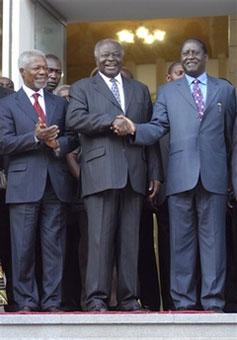NAIROBI, Kenya — The political bickering continued in Kenya on Friday, and so did the violence, with young men in gangs from opposing ethnic groups killing one another in the streets with machetes and bows and arrows.
Enlarge This Image

Walter Astrada/AFP--Getty Images
Ethnic clashes in the central Kenyan town of Nakuru.
Nakuru, one of the biggest towns in the troubled Rift Valley, seems to be the new trouble zone. Witnesses said fighting erupted there late Thursday when mobs of Kikuyus, the ethnic group of Kenya’s president, mobilized to avenge attacks suffered at the hands of other ethnic groups.
Witnesses said Kikuyu gangs built roadblocks to stop police officers from entering certain neighborhoods and then burned homes and businesses belonging to two other groups, Luos and Kalenjins. Those groups sent out their young men to confront the attackers, resulting in a citywide riot with hundreds of homes burned, dozens of shops destroyed and at least 10 people killed. Some witnesses said dozens of bloody corpses filled the town’s morgues.
The situation had gotten so out of hand by Friday evening that the authorities had imposed a dusk-to-dawn curfew.
“It’s totally unsafe here,” said Peter Geche, a taxi driver in Nakuru, on Friday afternoon. “So many people have been killed by arrows.”
More than 650 people have been killed in Kenya since a disputed presidential election in December, and the latest clashes show how the violence has taken on a momentum of its own, which the authorities appear unable to stop.
Police officials have sent reinforcements to Nakuru, which is about 100 miles northwest of Nairobi, the capital. Officers have dismantled some of the roadblocks and fired tear gas to disperse the mobs, but witnesses said any calm that might have been achieved would be short-lived.
In Nairobi, politicians continued to hurl accusations about who was at fault for spoiling what could have been a breakthrough moment the day before.
Mwai Kibaki, Kenya’s president, who won re-election by a thin margin, and Raila Odinga, the top opposition leader, who says the election was rigged and that he in fact won, met Thursday for the first time since the vote. The two have been under enormous pressure to negotiate. Many Kenyans were hoping that they would strike a compromise and end the turmoil, which has battered the economy and threatened to reverse decades of stability.
But immediately after the meeting, Mr. Kibaki gave a short speech in which he referred to himself as Kenya’s “duly elected president,” and opposition leaders then held a news conference denouncing what he said.
On Friday, government officials accused the opposition of trying to torpedo the peace effort.
“It’s very sad,” said Alfred Mutua, a government spokesman. “We were giving them the benefit of the doubt. And for them to issue a condemning statement after the two leaders had just talked about reconciliation, that’s hypocritical.”
Salim Lone, a spokesman for the opposition, fired back that “the whole world knows who ruined the event yesterday.”
“The president’s words certainly eliminated what we thought would be a feel-good atmosphere,” Mr. Lone said.
The two sides spent Friday holding separate meetings and preparing for more negotiations, which are being brokered by Kofi Annan, the former United Nations secretary general. No doubt, there is a lot of thorny ground to cover.
Mr. Odinga is insisting on a new election and to be an equal partner in a transitional government. Mr. Kibaki has scoffed at those demands and moved ahead with appointing the most powerful ministers in his government. Western diplomats have said there was such widespread cheating on both sides that it is impossible to tell who really won the vote in December.
The next step in the talks will be for the two sides to agree on a framework for substantial discussions. But even that will be difficult. The government is saying that it will not entertain the creation of a special post for Mr. Odinga, or the idea of a new election, unless ordered by a court. The opposition says the flawed election must be addressed if there are to be any negotiations at all.
Kenyan Gangs Clash in New Trouble Spot - New York Times By JEFFREY GETTLEMAN Published: January 26, 2008







